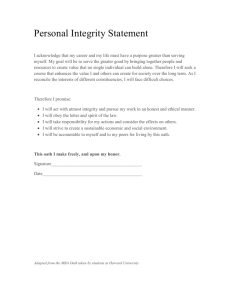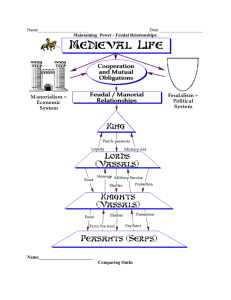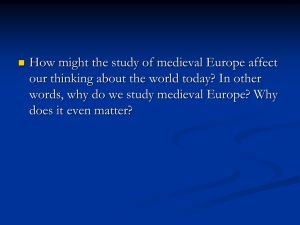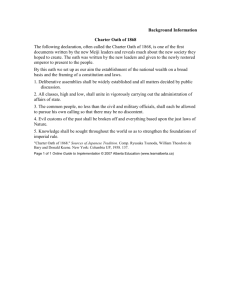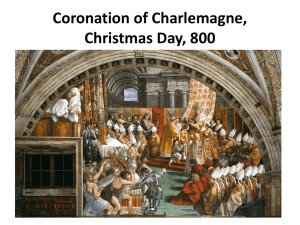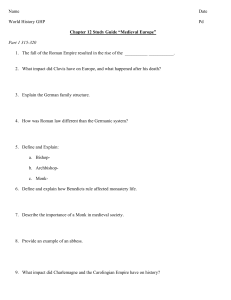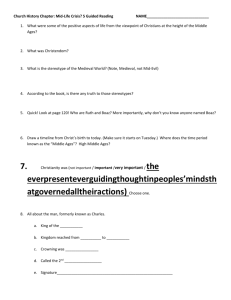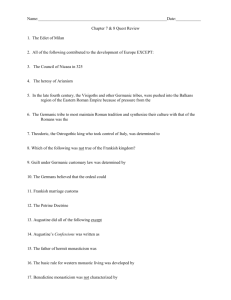Carolingian Oaths - Kelsey JS Ransick
advertisement
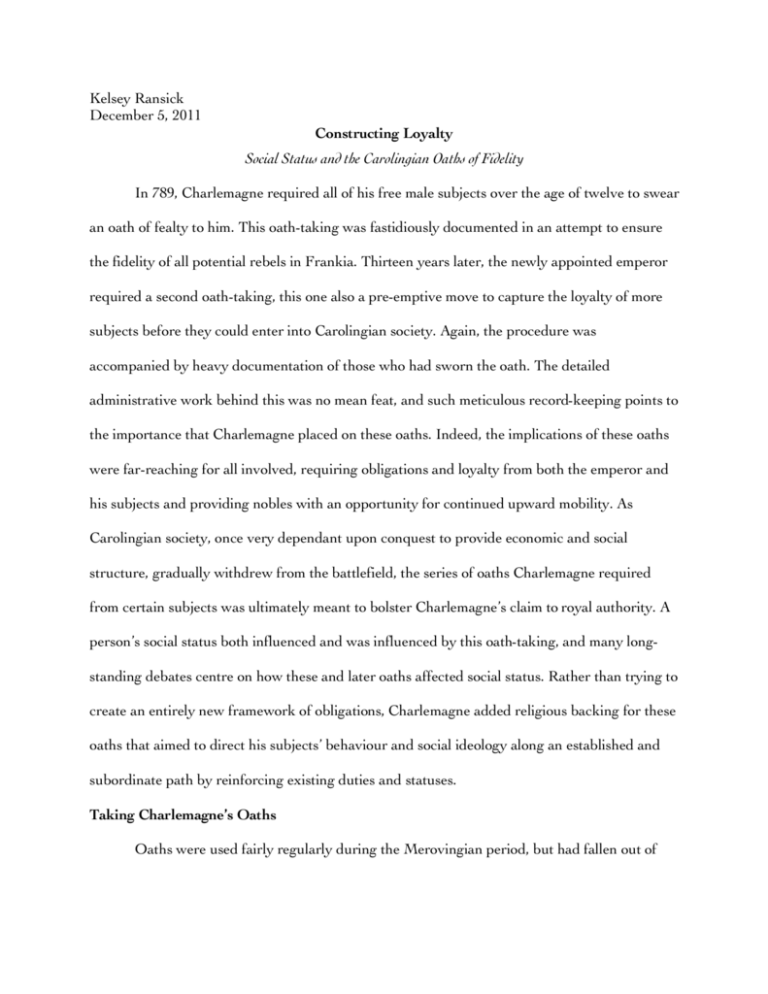
Kelsey Ransick December 5, 2011 Constructing Loyalty Social Status and the Carolingian Oaths of Fidelity In 789, Charlemagne required all of his free male subjects over the age of twelve to swear an oath of fealty to him. This oath-taking was fastidiously documented in an attempt to ensure the fidelity of all potential rebels in Frankia. Thirteen years later, the newly appointed emperor required a second oath-taking, this one also a pre-emptive move to capture the loyalty of more subjects before they could enter into Carolingian society. Again, the procedure was accompanied by heavy documentation of those who had sworn the oath. The detailed administrative work behind this was no mean feat, and such meticulous record-keeping points to the importance that Charlemagne placed on these oaths. Indeed, the implications of these oaths were far-reaching for all involved, requiring obligations and loyalty from both the emperor and his subjects and providing nobles with an opportunity for continued upward mobility. As Carolingian society, once very dependant upon conquest to provide economic and social structure, gradually withdrew from the battlefield, the series of oaths Charlemagne required from certain subjects was ultimately meant to bolster Charlemagne’s claim to royal authority. A person’s social status both influenced and was influenced by this oath-taking, and many longstanding debates centre on how these and later oaths affected social status. Rather than trying to create an entirely new framework of obligations, Charlemagne added religious backing for these oaths that aimed to direct his subjects’ behaviour and social ideology along an established and subordinate path by reinforcing existing duties and statuses. Taking Charlemagne’s Oaths Oaths were used fairly regularly during the Merovingian period, but had fallen out of Ransick 2 use, beyond securing the fealty of the most powerful nobles, during the seventh century.1 Charlemagne’s father had required oaths of all his magnates, but this was far from Charlemagne’s own eventual requirement of oath-taking by all his free male subjects, including clergy. Throughout his reign, Charlemagne’s main vehicle for spreading royal legislative pronouncements was the capitulary, distributed and enforced by missi. As the authors of The Carolingian World point out, these missi, “through their own actions, or lack thereof…could make enemies for the king”.2 For instance, in 788, Tassilo, a grandson of Charles Martel and therefore a member of the Carolingian family, was accused of plotting with the Avars to attack the Franks.3 He had previously sworn various oaths both to Pepin, Charlemagne’s father, and Charlemagne himself. When questioned, Tassilo and his fellow “conspirators” claimed that he had not sworn these oaths, and therefore had not broken any loyalty to Charlemagne.4 Charlemagne, however, saw Tassilo’s betrayal as twofold: “he had seduced away the loyalty of others among the king’s vassals, and he had instructed his own men to swear Charlemagne false oaths”.5 Not only had Tassilo threatened Charlemagne’s authority, but the missi’s failure to extract an oath from all required subjects had also endangered the kingdom. Soon after, in 789, Charlemagne called for his subjects to swear the first general oath. The capitularies disseminating the process read as follows: “The king now orders that an oath of fidelity shall be sworn by all the people, including even serfs who hold benefices or offices or 1 Charles E. Odegaard, “Carolingian Oaths of Fidelity,” Speculum 16, no. 3 (1941): 284, http://jstor.org. Marios Costambeys, Matthew Innes, and Simon MacLean, The Carolingian World (Cambridge: Cambridge University Press, 2011), 79. 3 Ibid., 70. 4 “Quam ob rem istam sacramenta sunt necessaria, per ordine ex antiqua consuetudine explicare faciant, et quia modo isti infidels homines magnum conturbium in regnum domni Karoli regi voluerint terminare et in eius vita consiliati sunt et inquisiti dixerunt, quod fidelitatem ei non iurasset”. Odegaard, “Carolingian Oaths of Fidelity,” 284, n.3. 5 Janet L. Nelson, “Kingship and Empire in the Carolingian World,” in Carolingian Culture: Emulation and Innovation, ed. Rosamond McKitterick (Cambridge: Cambridge University Press, 1994), 63. 2 Ransick 3 who have been honored by their lords with vassalage and who possess arms”.6 In practice, this meant that the leading land- and office-holders of the kingdom would swear the oath. Compared to later oaths, the 789 oath was fairly simple: “I---promise my lord king Charles and his sons that I am faithful and shall be so all the days of my life, without fraud and evil design”.7 That this simplicity left some room for interpretation of faithfulness may be a major reason the later 802 oath went into such detail on its obligations and implications. After the incident with Tassilo in 788, Charlemagne released a set of “notes” for the missi, who were then sent out to explain the importance of and justification for the 789 oath. The justification for the oath was “first, that it derives from ancient custom and, second, that those unfaithful men recently plotted to cause great strife in the realm of the lord king Charles and conspired against his life and said, when questioned, that they had not sworn fidelity to him”.8 Tassilo's claim that he had not broken his fidelity because he had not sworn it in the first place impressed upon Charlemagne the need to ensure his subjects' loyalty, more explicitly. The conspirators evidently felt that “they were not in any state of obligation to the ruler that transcended other sworn commitments, such as to their fellow conspirators or to another lord”.9 Charlemagne and his advisors, however, evidently saw their actions as infidelity, oath or no oath, and the loophole they had discovered was just that—a loophole. Charlemagne operated on the assumption that his subjects, such as Tassilo, had sworn oaths to him because they owed him loyalty and recognised as much. Those who did not outright refuse to swear the oath were therefore assumed to acknowledge the fidelity they owed the king. Charlemagne was “determined that no one else should feel [this loophole] was available to them as a potential 6 Odegaard, “Carolingian Oaths of Fidelity,” 284. P.D. King, trans., Charlemagne: Translated Sources (Lancaster: University of Lancaster, 1987), pg. 221. 8 Ibid., 223. 9 Roger Collins, Charlemagne (Toronto: University of Toronto Press Inc., 1998), 127. 7 Ransick 4 justification for supporting any other member of the royal house against the reigning monarch”.10 Thus, Charlemagne determined that the oath “ought to be sworn by bishops and abbots, counts and royal vassals, bishops' deputies [vicedomini], archdeacons and canons”11 as well—in short, royal vassals and landowners to whom the king had awarded benefices.12 This reassertion of the oath seemed to suffice for almost a decade, until Charlemagne was crowned Roman Emperor. Shortly after his imperial anointing, Charlemagne called for another oath of fidelity, this one to “Caesar”,13 from all his free male subjects. With this oath, taken on the relics of saints, the oath-taker again promised to be faithful without deceit. The missi, however, were charged to announce additional obligations to not “introduce enemies into the king's realm and…not to consent to nor to keep silent about any act of infidelity”.14 The vital concept of fidelity in this oath further expanded to include: Serving God, not stealing any of the emperor’s property…not harming any churches, widows, orphans, or pilgrims, and not neglecting a benefice of the emperor…[not] to obstruct payment of his dues or rents…a commitment to fair judicial procedures, upholding the law, and supporting the missi or leading men in their exercise of justice.15 This extension of what loyalty to the ruler encompassed was palatable because of the manner in which these oaths were taken—namely, that these oaths were sworn on saints’ relics. The logic behind this was threefold. First, the religious backing of the oaths made the oath more acceptable to the oath-takers. Second, included in the oath is a declaration that links the swearer’s actions in this world even more intricately with his spiritual welfare. The beginning of the oath read as follows: 10 Ibid., 127. King, Charlemagne, 223. 12 Collins, Charlemagne, 127. 13 Patrick Geary, ed., Readings in Medieval History (Mississauga: Broadview Press, 2003), 315-16. 14 Odegaard, “Carolingian Oaths of Fidelity,” 291. 15 Rosamond McKitterick, Charlemagne: The Formation of European Identity (Cambridge: Cambridge University Press, 2008), 269-270. 11 Ransick 5 The oath whereby I reaffirm from this day forth, being of sound mind and with no evil intent from my part to his, I am a faithful subject of our lord and most pious emperor, Charles, son of King Pippin and Queen Berthana, for the honor of his kingdom, as a man ought lawfully to be towards his lord; so help me God, and these relics of the saints here situated, for all the days of my life with all my will and with what intelligence God has given me, I will so attend and consent.16 The presence of holy remains during the oath-taking process made very obvious the spiritual danger of betraying of the emperor. Thus, as part of Charlemagne’s “effort to maintain or to reinforce [his] power…the religious sanction of oaths of fidelity”17 effected the unification religious and political obligations. 18 Thirdly, the emperor was responsible for the spiritual health and salvation of his subjects. Later in the capitulary that included this oath, Charlemagne stipulates that “everybody is personally to strive, to the best of his understanding and ability, to maintain himself fully in God’s holy service, according to God’s command and his own promise; for the lord emperor cannot himself provide the necessary care and discipline for each man individually”.19 By further ordering that “no one is to presume to defraud, rob or otherwise harm God’s holy churches or widows or orphans”,20 and because Charlemagne cannot help each of his one of subjects separately, the responsibility of leading a Christian life is entrusted to his subjects to carry out independently, though obviously with royal support and encouragement. Not all persons within the empire were required to take the oaths. In 789, Charlemagne only required an oath from “the leading men of the realm, both lay and clerical”.21 In 802, however, Charlemagne expanded the base of oath-takers to include all free men over the age of twelve. Originally, then, aristocrats and clerics were the focus of royal efforts to assert Carolingian dominance. This is because, having recently risen from among the aristocratic 16 Geary, “Readings in Medieval History,” 320. Odegaard, “Carolingian Oaths of Fidelity,” 284. 18 Collins, Charlemagne, 155. 19 King, Charlemagne, 234. 20 Ibid., 235. 21 Collins, Charlemagne, 126. 17 Ransick 6 ranks, the Carolingians needed to impress their pre-eminence upon their peers. Included next in the oath-taking process were farmers, merchants, and other non-aristocratic but still free men. Missing were the women and slaves in the Frankish world. Why were these decidedly numerous populations left out? Did Charlemagne feel that women and slaves would not be able to rebel against him? Would their promise not carry as much weight or be as valid as those of their husbands or masters? As far as the women of the empire were concerned, the answer may lie in their relationship with their fathers and then, after marriage, to their husbands. When a man and woman entered into a marriage contract, “the guardian [of the woman] gave over to [the fiancé] the symbols of his authority”,22 indicating that the woman would come under the control of her husband after the marriage ceremony. If the husband swore the oath to the emperor and the wife was under his authority, it may be that there was no reason for the wife to swear the oath as well: any misconduct would be the responsibility of the husband, who had already assured the emperor of his loyalty. Similarly, slaves were the property of men who swore the oath of loyalty. The master’s promise to the emperor implied that he would look after not only his own conduct, but also the conduct of slaves under his control. Social Implications Charlemagne’s oaths were constructed very carefully to protect the king and outline specific duties for the oath-takers. The 802 oath also included the promise that the oath-taker would be faithful to Charlemagne “as a man ought rightfully be towards his lord”.23 As discussed, this oath was significantly more specific in its concept of loyalty to Charlemagne and duties that swearers owed to him. This oath, as McKitterick asserts, “created a means of 22 Pierre Riché, Daily Life in the World of Charlemagne, trans. Jo Ann McNamara (Philadelphia: University of Pennsylvania Press, 1988), 54. 23 McKitterick, Charlemagne, 270. There has been much discussion on the translation of this phrase, as we shall see below. Ransick 7 trumping all other personal and institutional loyalties while yet not negating them”.24 Furthermore, the oath, “taken solemnly and publicly on holy relics, underwrote a hierarchy in which people had to promise to do more or less whatever they were told”.25 Charlemagne required that those who were to take the oaths “be publicly informed, so that each man may understand how many important matters are contained in that oath”.26 The public announcement of the oath’s obligations, beyond being a practical way to spread information to a large group of people at once, inherently acknowledges the social ramifications of swearing the oath. Townspeople, abbots, or any audience member could observe who was present, who was listening, and who swore the oath. The public declaration of loyalty to the emperor allowed one to continue on with daily business, whereas a refusal to swear might lead to imprisonment.27 By making the announcement of obligations a public event, Charlemagne’s administration forced the free men of the realm to accept his terms before they could “join” society. As the oath acted as more of an after-the-fact rite of passage into Carolingian society, many scholars28 have suggested that the oath-taking acted more to reinforce existing loyalties or obligations than to create entirely new ones. To evaluate this further, look again at the 802 oath: “The oath whereby I reaffirm from this day forth, being of sound mind and with no evil intent from my part to his, I am a faithful subject of our lord and most pious emperor, Charles, son of King Pippin and Queen Berthana”.29 The word ‘reaffirm’ here can indicate two types of promises. The first, that the swearer had taken the previous oath in 789 and the new oath will reinforce his earlier assurance of loyalty. The second, that the swearer acknowledges the loyalty 24 Ibid. Costambeys, Innes, and MacLean, The Carolingian World, 185. 26 Geary, “Readings in Medieval History,” 315-16. 27 We have no record of anyone refusing to take these oaths, but it seems likely that imprisonment or banishment would follow, should a man refuse to swear. 28 See Costambeys, Innes, and MacLean, The Carolingian World, pg. 191. 29 Geary, “Readings in Medieval History,” 320. 25 Ransick 8 he already owes Charlemagne as king of the Franks and Roman Emperor, as in the case of those who had been underage or otherwise not fully in residence of the realm at the time and would therefore not have sworn the previous oath. If we do not limit this second interpretation of the phrase—that of a pre-existing loyalty merely being reavowed—exclusively to those who had not sworn the earlier oath, we open up the possibility of the oath serving as a general affirmation of allegiance and loyalty inherently owed to the king by virtue of his position. In other words, it seems likely that the free men of the kingdom already owed Charlemagne certain obligations, and the oath was just a way to strengthen awareness of who owed what to whom and impress upon the swearers the spiritual consequences of infidelity. This loyalty to the king did not go unrewarded. In the Handbook for William, written by a woman named Dhuoda for her son between 841 and 843, Dhuoda and her family accepted that “the advancement that it brings you [my son] will be of great value both to you and to those who in turn serve you”.30 Dhuoda further advised her son to “look around as well and observe those who fight for [the king] loyally and constantly. Learn from them how you may serve him. Then, informed by their example, with the help and support of God, you will easily reach the celestial goal I have mentioned above”.31 Here we see that being loyal to the king not only improved one’s status on earth, but would also help ensure heavenly benefits. Though this advice was written a few decades after these two oaths were taken, it remains clear that within a generation, loyalty to the king was expected from all and brought the possibility of office-holding and greater wealth—both spiritually and temporally. Dhuoda, of course, was an elite woman. As members of the aristocracy, she and her family enjoyed a privileged position that “depended on their intimacy with the king as well as on 30 31 Dhuoda, Handbook for William, trans. Carol Neel (Lincoln: University of Nebraska Press, 1991), 26. Ibid., pg. 27. Ransick 9 their own wealth”.32 Many members of the aristocracy had long held their offices and land because of their relationship with the king. Included in the General Capitulary for the Missi in 802, following the oath, is the declaration that “the counts and the centenarii should, as they are desirous of the favour of our lord the emperor, provide for the missi who are sent upon them with all possible attention, that they may go about their duties without any delay”.33 As part of the oath, those who wish to remain in good standing with the king, and therefore be eligible for office-holding, must provide for the king’s agents. The swearing and fulfilment of this oath, then, qualifies men to hold social and political power within the empire. By the time Dhuoda was writing advice to her son, the mentality of serving the emperor had become thoroughly entrenched in Carolingian aristocratic mindset. She advises her son to “bear patiently the yoke that governs a servant and be faithful to your lord Charles…It is fitting for you and for all those who fight under their royal power to do so, and I wish that you serve them to good ends, faithfully, with all your might. For as we believe, God chose them and established them in royal power”.34 Here, it is evident that she believes the emperor’s right to prominence divinely sanctioned. As such, God’s approval of the monarch legitimises the offices awarded to his faithful subjects as well. For many of Charlemagne’s subjects, taking the oath required or opened up the chance of military service. In fact, the authors of The Carolingian World contend that the set of capitularies following the details of the first oath suggest that the oath was a kind of “prerequisite…for service in the army, that most significant badge of aristocratic identity”.35 This meant that elites, whose primary task and defining duty was their military service, had to swear 32 Riché, Daily Life, 99. Geary, “Readings in Medieval History,” 317. 34 Dhuoda, Handbook, 32. 35 Costambeys, Innes, and MacLean, The Carolingian World, 79. 33 Ransick 10 loyalty in order to remain in the military and maintain their elite status.36 Moreover, the oaths of loyalty and service lower-class men made extended the opportunity to not only serve but also rise in military ranks to those previously excluded from such upward movement. The early Carolingians had “worked diligently to create a substantial core of professional soldiers [and] since all men who owned sufficient land already were required to serve on expeditions, these new professionals were recruited from among those who were too poor to owe regular offensive military service”.37 These, “servi who were made vassalli served as elite heavily armed mounted troops, and such men might well have risen to hold unit commands”.38 These oaths, then, may have opened the door for these poor men to join in an occupation had long been the marker of aristocracy. Organising Society When trying to decide if the capitularies were ideological authoritative declarations or a vehicle for demanding specific actions from royal agents, “we [must] take seriously the exhortatory rhetoric of the capitularies and think about how it might have served to shape the identities and actions of those for whom it was intended—the king’s agents”.39 The capitularies that included these oaths were part of a conversation between Charlemagne and his representatives, and engagement in this dialogue “bolstered the local authority of counts and missi by legitimising their claims to act on the ruler’s behalf”.40 These oaths were the first step towards inclusion in the empire’s office-holding elite class. Participation in the empire could come in the form of military service, honores or ministeria, or numerous other roles, but without having taken the oath, none of these routes would be open to a free man. In the construction of 36 Ibid. Bernard S. Bachrach, Early Carolingian Warfare Prelude to Empire (Philadelphia: University of Pennsylvania Press, 2001), 83. 38 Ibid., 67. 39 Costambeys, Innes, and MacLean, The Carolingian World, 187. 40 Ibid. 37 Ransick 11 the 802 oath, then, it is evident that “personal fidelity was seen as the social glue that would hold the empire together”.41 By taking these oaths, elites “bought into a political system that not only opened up to them the prospect of access to the ruler and promotion to a wider imperial stage, but also helped legitimise and reinforce their existing influence”,42 just as Charlemagne hoped to fortify his power. Their promise, in turn, thus reinforced the vertical ties so essential to Carolingian social organisation. Vertical ties played a key role in Carolingian and later medieval society, but equally prominent—and legislated against—were horizontal ties. In the 779 Capitulary of Herstal, Charlemagne proclaimed, “concerning oaths entered into by swearing together in a fraternity, that no one should dare to perform them”.43 Such oaths would have formed horizontal ties between aristocrats, something that Charlemagne and his relatives actively sought to prevent. In light of this edict, the oaths Charlemagne constructed plainly indicate that he was focused on creating vertical ties between himself and the aristocracy, and as such, he “vigorously legislated against the formation of horizontal social bonds (branding them as coniurationes— conspiracies) and insisted on the primacy of vertical bonds of obligation based on sworn fidelity and lordship”.44 Charlemagne further declared that, “ no one is to presume to form an armed following”.45 Obviously, the king perceived a serious threat in horizontal obligations and allegiances in brotherhoods and personal armies formed. Thus, “at a relatively early stage in the reign, it seems to have been recognised that other sworn associations, in which oaths would have been taken on the Gospel books and/or relics [just as those sworn to the king would be] and thus be sacred in character, could cut across what should have been the clear lines of obligation 41 Ibid., 185. Ibid., 191. 43 Geary, “Readings in Medieval History,” 298. 44 Costambeys, Innes, and MacLean, The Carolingian World, 190. 45 King, Charlemagne, pg. 204. 42 Ransick 12 between subject and monarch”.46 If society’s relationships of dependence and obligation “flattened out”, Charlemagne’s importance at the top of the social hierarchy might become diluted or unclear. In order to maintain his power and authority, therefore, bonds of dependence and loyalty all had to lead one place—Charlemagne himself. The repeated and emphatic attempts to fortify the boundaries between public duties and “membership of local aristocratic culture shows that Carolingian government was not something that existed external to society, but was rather deeply enmeshed in pre-existing social structures”.47 The aristocrats had, until recently, been peers of the Carolingian royal family, so Charlemagne had to “persuade [his] aristocratic followers to consider themselves royal agents”. 48 During Pippin III’s rule and early in Charlemagne’s royal tenure, these men would have understood their place in the empire through fighting alongside the king in campaigns. However: In the new post-expansion world the court’s need to stabilise and routinise their power into predictable roles became increasingly pressing. This was not just, or even mainly, about satisfying an urge to create administrative efficiency—it was about giving these powerful men a stake in the polity from which they could profit without having to reach for their swords.49 The aristocrats’ oath-taking and subsequent approval for office-holding redirected their focus and power base along a previously lesser source of prestige. At the same time, Charlemagne aimed his efforts at preventing the continuation or growth of inter-aristocratic affiliations that could threaten his own power by creating multiple allegiances or a hierarchy of loyalty, which could result in Charlemagne not on top. The threat of Charlemagne being anything but the 46 Collins, Charlemagne, 108-109. Costambeys, Innes, and MacLean, The Carolingian World, 189. 48 Ibid. 49 Ibid. 47 Ransick 13 topmost authority in his own kingdom therefore necessitated a safety net—the oaths—to catch the loyalty of his subjects before they considered rebellion, rather than after. From this, it appears that Charlemagne’s subjects made oaths in accordance with their social status and even the potential threat they could pose to him. A free but poor landowner in western Neustria obviously had less access to ideas and resources that could be used to start a rebellion than a rich magnate living at court alongside other educated and ambitious men. For instance, Charlemagne declared that “no one should presume to ignore a summons to the host from our lord the emperor, and that no count should be so presumptuous as to dare to excuse any of those who ought to go with the host, either on the pretext of kinship or through the enticement of any gift”.50 This is an unmistakable declaration of social and political rank. Counts are forbidden to disregard the king’s order to appear when summoned, as the king has the ultimate authority to summon and dismiss those who are his subjects because they have sworn the oath. By including religious relics in the oath-taking process, using oath-taking as a prerequisite for holding office, forbidding the formation of armed followings and swearing into brotherhoods, and stressing the limits on aristocratic power, Charlemagne was able to use these oaths as a tool “to construct a basis for political and moral obligation”.51 Roman or Feudal Oaths? The construction of obligations may be an inaccurate way to portray the oaths’ function in Carolingian society. Certainly, that the overall intent of these oaths was to “secure” loyalty and obedience to Charlemagne is fairly obvious. However, “a thick forest of tangled argumentation”52 surrounds the debate on the innovation and nature of the relationships that these oaths created. What traditions, if any, did these oaths build on? Were the obligations to 50 Geary, “Readings in Medieval History,” 316. Collins, Charlemagne, 155. 52 Odegaard, “Carolingian Oaths of Fidelity,” 284. 51 Ransick 14 the king the same for everyone? Were the bonds formed feudal relationships, as we would recognise them from the 12th or 13th century? The argument presented in The Carolingian World maintains that these obligations were already in place in some form. 53 For instance, from Merovingian times and through at least the reign of Pippin III, royal bodyguards (antrustiones) were inducted into service with the understanding that those who promised fidelity to the king would in return receive royal support,54 just as loyal nobles stood to gain offices for their fidelity. The surviving formulary that discusses this induction process, entitled “Concerning a King’s Antrustio”, begins by asserting that “it is appropriate that those who have promised [to the king] continuing faith (fidem) should be given [his] support (auxilium)”.55 Even before an oath in mentioned, it is clear that the promise “denotes the binding of the subject to the king [and] describes the inferior making a promise…regarding his continuing faithfulness”.56 After this promise, a man was referred to as a fidelis and he finally made an oath, which “continued a tradition that was firmly entrenched in the West [as] Roman soldiers swore their faithfulness both to their commanders and to the emperor”.57 This entire process was scrupulously documented, just as the oaths taken by Charlemagne’s subject would be a few decades later. Ferdinand Lot and Auguste Dumas even believe that the 802 oath was modified directly from the Merovingian oath of fidelity, known as the leudesamium.58 Unfortunately, we no longer have the formula for this oath. However, Dumas strongly asserts that “it is impossible to distinguish between the Carolingian leudesamium, or subjects’ oath, and the oath of the vassals, for they are one and the same”.59 However, these oaths may not be such simple constructions. 53 Costambeys, Innes, and MacLean, The Carolingian World, 189. Bachrach, Early Carolingian Warfare, 68-69. 55 Ibid., 68. 56 Ibid., 69. 57 Ibid. 58 Odegaard, “Carolingian Oaths of Fidelity,” 286. 59 Dumas summarised in Odegaard, “Carolingian Oaths of Fidelity,” 286. 54 Ransick 15 Charles Odegaard offers a different interpretation of these oaths, specifically that a single oath might carry different implications for different oath-takers. Odegaard posits: There are in the ninth century two oaths of fidelity differing in content one from the other. The subject's oath calls for obedience and loyalty to the ruler. The oath of the fideles who serve the king calls for a promise of service with aid and counsel…The obvious difference between the ordinary subject and the royal servant which makes reasonable a difference of oaths precedes the ninth century. 60 Despite the significant lack of sources about the content of Merovingian oaths, it is quite reasonable to expect such a duality of oaths in earlier traditions of oath-taking as well. 61 When Charlemagne adapted his earlier oath to its form in 802, there was no “constitutional change, no shift (as is sometimes alleged) from ‘sovereignty’ to ‘contractual’ authority, no watering-down of ‘subjects’ obligations’…The relationship between Frankish king and aristocracy had been based all along on mutual, personal, service and mutual advantage: there was no break here with Merovingian tradition”.62 What was novel was the religious backing of the oath. The swearing on relics gave the duties a subject owed to the ruler a supernatural sanction. The extension of what loyalty to the king meant also introduced some unprecedented ideas, as “older, Roman, ideas of maiestas or treason could be found in the earlier oath...[but] the 802 oath… sought to make any action that was economically detrimental to the emperor a treasonable one”.63 Clearly, these oaths had some components based in tradition, evident in the ideology of reinforcing loyalty and submission to the king (or emperor), and some more unprecedented components, evident in the expanded definition of loyalty and obligation, as well as the spiritual ramifications of betrayal. However, the question remains: do we see in these oaths the creation 60 Odegaard, “Carolingian Oaths of Fidelity,” 295. Ibid. 62 Nelson, “Kingship and Empire,” 62. 63 Collins, Charlemagne, 155. 61 Ransick 16 of feudal ties akin to those of the later Middle Ages or merely their distant predecessors? As we lack contemporary sources that comment directly on the continuity of oath formulas and social obligations, the crux of the debate lies in the translation of what oath formulas we do have. Scholars principally debate the translation of the 802 oath, especially in regards four words: homo, dominus, fidelity, and vassals. The first, homo, can be interpreted as either vassal or man, which is to say subject.64 In both interpretations, “the subject promises to be faithful to lord Charles, the emperor, with regard to his realm and his rights, just as a man rightly should be to his lord”. 65 George Waitz translated homo as “vassal so that the clause reads ‘just as a vassal should be to his lord’. Thus the subject’s fidelity to the emperor is now the same as that of a vassal to his seigneur”.66 Odegaard agrees that “homo may mean vassal or fidelis in the narrow sense of faithful servant” but also asserts that “it was a very elastic term. It could be applied to anyone who was under the control of another in greater or less degree. Slaves, servants, clients, tenants of wealthy landowners, dependents of all kinds were called homines. In its widest use, homo means ‘man’ in the generic sense”.67 Ultimately, Lot asserts that, “Il n’y a d’ailleurs aucun doute”68 that the oaths were taken in the vernacular. If Lot is correct and these oaths were taken in the vernacular, we have no way of knowing how the troublesome word homo was translated by those administering the oath and therefore cannot assume the level of vassalage that homo alone implies. Dominus is an equally troublesome word. In this context, it clearly indicates a dominant person in relation to the homo, as “the texts describe a man promising to be as faithful as a man 64 Odegaard, “Carolingian Oaths of Fidelity,” 286. Ibid., 285. 66 Ibid. The original Latin reads: “Sicut per drictum debet esse homo domino suo or sicut homo per drictum debet esse domino suo”. 67 Ibid., 288. 68 Ferdinand Lot, Fidèles ou Vassaux: Essai sur la Nature Juridique du Lien Qui Unissait les Grands Vassaux à la Royauté Depuis le Milieu du IXe Jusqu’a la Fin du XIIe Siècle” (Paris: Librairie Émile Bouillon, 1904), 247. 65 Ransick 17 should be to his dominus, his lord”.69 However, “the measure of that domination is no more specific than the measure of subservience of homo. The dominus might be a master of subjects or a master of slaves as well as the seigneur of faithful servants”. 70 Regardless of his subordinates, the title of dominus applied to men of prestige and power. 71 Pierre Petot, on the other hand, refuses to translate homo as ‘vassal’ or dominus as ‘seigneur’”.72 According to Petot, modern usages of these terms have confused the meaning of these words from their meanings in the 9th century. Petot asserts that “the epithet dominus has [since] given way to rex: there is no thought of vassalage here…We have rather [multiple possible] formulas for the oath of a subject; none of them are vassal's oaths. This assertion does not of course deny the fact that vassals did often follow up their commendation with an oath of fidelity”.73 Like homo and dominus, the terms fidelity and vassal are often misconstrued. As Odegaard points out, the word vassal is often used to describe any person in the employ of a seigneur who began his service with the “ceremony of commendation to which an oath of fidelity is frequently joined. This represents a perversion of the term ‘vassal’ which was applied in the Carolingian period not to all these commendati but rather only to a group within the commendati who had a particular and definite function the essence of which was skilled military service”.74 Dumas does not believe that a more rigorous oath of fidelity exists than the one that all of Charlemagne’s subjects took in 802, yet “there still remains a difference between the actual status of the subjects and that of the magnates who serve the king”.75 The difference is not in the 69 Odegaard, “Carolingian Oaths of Fidelity,” 288-289. Ibid. 71 Ibid. 72 Ibid., 286. 73 Petot summarised in Odegaard, “Carolingian Oaths of Fidelity,” 287. 74 Odegaard, “Carolingian Oaths of Fidelity,” 287-288. 75 Dumas summarised in Odegaard, “Carolingian Oaths of Fidelity,” 289-290. 70 Ransick 18 wording of the oath, as all free men took the same, carefully constructed oath, but in, according to Dumas, the manner in which the oath is taken. More specifically: Certain fideles swear their oath at the palace in the presence of the king whom they see in flesh and blood. These are, of course, the magnates such as bishops, abbots, counts, and vassals… The mass of the subjects, however, do not see the king, who receives their oaths through an intermediary, a missus or count…[Those] who have sworn their fidelity personally to the king feel bound to him ‘non pas plus etroitement, mais plus serieusement’ than those who do not swear in person to the king and accordingly render more service than the ordinary subjects. 76 This distinction makes sense, but because Charlemagne did not feel it necessary to change the formula of the oath, the expectation of this system’s success implies a pre-existing understanding of the difference between those persons who would swear the oath to Charlemagne in person and those who would do so through an intermediary. In the end, given the variety of ways these terms were used in the past and are currently used, “one cannot assert that the use of the terms fidelitas and fideles, and of homines and domini even when they are linked together necessarily imply the status of a ‘vassal or faithful servant’”.77 Though roots of the vassal/seigneur relationship can certainly be seen in oath-taking such as this, the resulting bonds were not yet in the form we would recognise as feudal ties. Odegaard asserts that while “the subjects quite naturally promise to be obedient to the king [in the oaths]…the chief emphasis is placed upon their not interfering with his government, his commands, his property, his taxes, his army, and his courts…Charlemagne is really asking only for an oath of loyalty, not an oath of service”.78 This service refers to obligations on both sides of the relationship these oaths formed. The Carolingian oaths and later oaths of fidelity and vassalage differ in the lack of reciprocity in the former’s formula: while Charlemagne was responsible for his subjects’ souls and general well being, this was because he was king and they 76 Ibid. Odegaard, “Carolingian Oaths of Fidelity,” 288-289. 78 Ibid., 291. 77 Ransick 19 were his subjects, not just because their oath-taking implied obligations on Charlemagne’s end in return. Charlemagne did award offices and favours to certain loyal aristocrats, but not to all who swore the oath and not solely because they swore the oath. Rather, in swearing the oath, nobles took the first step towards a closer relationship with the king, who might grant them offices if he enjoyed their company or found such appointments politically beneficial. While Lot believes that “le contrat vassalique résultant précisément de l’union de la fidélité avec l’hommage, [et] il est clair que vouloir séparer l’un de l’autre dans l’étude du régime feudal c’est tomber dans un pur non-sens”,79 the full merger of these two concepts was not yet complete when Charlemagne demanded that these oaths be sworn. While many oath-takers did pay hommage to Charlemagne and all promised fidelity to him, by no means were these two distinct promises required of every oath-taker. As Odegaard points out: In the oath of 789 the subject was to promise his lord king Charles to be faithful all the days of his life without deceit and ill-will…This is surely a negative way to phrase the obligation of fidelity. The subject hardly gives himself over body and soul to the king; he rather promises not to be a traitor. The emphasis is upon loyalty and security for the king rather than upon devoted service to the master.80 In other words, there was still a difference between vassalage and a promise of loyalty, despite the common coincidence of these two concepts. Moreover, the overriding desire for Charlemagne’s subject to not interfere with the government but to be loyal and obey the king’s commands is not the demand Charlemagne would have made of the magnates who surrounded him and served him daily. The majority of the oath-takers would were distanced both physically and socially because they were so numerous and so poor. Odegaard points out that as they did not personally serve the king, they could not develop the same sentiments toward him that those who came into personal contact 79 80 Lot, Fidèles ou Vassaux, 248. Odegaard, “Carolingian Oaths of Fidelity,” 290. Ransick 20 with him did. 81 The oath of vassalage was not required of all subjects because “something less than intense personal devotion was enough for the king's purposes”.82 Vassalage in the later feudal relationship involved a personal relationship between the lord and the vassal. Thus, as the vast majority of these oath-takers would never see, let alone serve the king, these oaths were not yet fully-fledged oaths of vassalage. Such feudal oaths, as we understand them, were on the way, however. Writing about 40 years later, Dhuoda hopes for salvation for “you who struggle here to render faithful service both to your several earthly lords and to that singular Lord who gives fitting reward for your merits from his own riches”.83 This mention of multiple lords on earth reveals a proliferation of vertical ties of loyalty and obligation. By the time Dhuoda was writing, then, oaths of loyalty binding a vassal to his lord had appeared in more than just the connection between the king and his subjects, but between subjects as well. The earlier distinction between magnates and citizens of lower social standing also illuminates this expanding network of oaths because “the subject's oath is hardly adequate for those who are actually in the king's service…One would expect to find not only this oath [of 802] which embodies the lighter responsibilities of a subject, but also an oath which embodies the heavier responsibilities of the narrower group of royal servants, in other words, a duality of oaths” explored earlier.84 Unfortunately, we have no direct evidence of such an oath. This silence from the sources does not rule out the possibility of such an oath existing. Furthermore, as Odegaard says, there is a later oath that may include what he describes as “heavier” responsibilities. The fideles “in the narrow sense85 [of the word] were often called upon to swear 81 Ibid., 292. Ibid. 83 Dhuoda, Handbook, 33. 84 Odegaard, “Carolingian Oaths of Fidelity,” 292. 85 See page 16. 82 Ransick 21 an oath of fidelity, sometimes at the time of commendation into service, sometimes without commendation”.86 In 858, for instance, we have records of magnates swearing the following oath: As long as I shall be able and as long as I shall know how, God willing, without treachery or deceit, I shall be a faithful helper to you with counsel and with aid in accordance with my office and my person so that you can govern and hold with honor and strength and with your due that power which God has given to you with the realm and with the royal name, in accordance with His will and for your salvation and the salvation of your faithful followers; and I shall not turn from you to any other man as long as God gives me intelligence and ability”.87 Odegaard asserts that “here is no mere oath of loyalty though loyalty is clearly embodied in the oath; much more is involved than in the subject's oath”. 88 With this oath, the magnate promises to offer faithful assistance, and “his specific service will depend quite naturally upon his office and his person or status…This is an obvious servant's oath [which]…carries in its content a clear indication that the swearer must render service”.89 Though this oath is from 858, and may therefore indicate a step in the evolution of oath obligations, it seems more likely that “the ideas embodied in this oath are anything but exceptional….[and] there is ample evidence to indicate that similar oaths embodying these responsibilities were sworn by the fideles both before and after 858”.90 Instead of assigning these oaths a distinctively “Merovingian” or “feudal” label, we might read these oaths as a new form for existing obligations that would soon be adapted to new relationships. These oaths were part of a larger “intensification rather than a complete transformation of politics”.91 The 789 and 802 oaths reminded both king and subject of their relationship, but the latter introduced a new and expanded sense of what the loyalty in this 86 Odegaard, “Carolingian Oaths of Fidelity,” 292. Ibid., 293. 88 Ibid. 89 Ibid. 90 Ibid. 91 Costambeys, Innes, and MacLean, The Carolingian World, 191. 87 Ransick 22 relationship entailed. In the end, we find that “the distinctiveness of Carolingian government in the earlier ninth century was less of kind than of degree, thrown into sharp focus by contrast with the preceding phase of military expansion”.92 Conclusions As one of the first in a new line of kings, Charlemagne was tasked with defining the social hierarchy of his kingdom. Rather than start anew, he built upon existing ideas of obligation. His capitularies honed the distinction between himself and his nobles through a stunningly simple, yet powerful, single-stroke move—the swearing of an oath of loyalty. Thanks to the buttress of religion, the tradition of oath-taking now gave a man access to the empire politically and socially. Charlemagne designed these oaths to both establish and organise hierarchies of socio-political duty in the empire. The right to live in the empire, that is, to be a citizen, came through swearing the oath. That these oaths were sworn on holy relics and in God’s name is significant. By swearing fealty to Charlemagne in this way, a man risked his immortal soul should he break his oath. Clearly, Charlemagne believed, or at least hoped, that the majority of his subjects would feel bound by their oaths to him for fear of endangering their immortal souls. Additionally, the increasing inter-dependence of church and secular government reinforced the power of both of these institutions, and these oaths are a prime example of such corroboration. Charlemagne clearly used the relics’ religious authority to attempt to exercise power over his subjects. Scholars have suggested many motives for this oath-taking. For instance, Jacques Flach believes that “Charlemagne, jealous of the fidelity which vassals owe their seigneurs, [sought] to secure the same fidelity for himself”.93 Charlemagne ultimately “wanted to be the seigneur of all 92 93 Ibid. Flach summarised in Odegaard, “Carolingian Oaths of Fidelity,” 285. Ransick 23 his subjects: if not really their seigneur so far as the services he received from them was concerned, at least from the point of view of the fidelity which they swore to him”.94 Jealousy may not be the most defendable argument for the oath-taking, but the assertion that Charlemagne sought loyalty rather than service remains a valid one. This desire is reflected well in the 9th century poem, Waltharius. Towards the end of the poem, Waltharius expresses perfectly what the Frankish kings strove to obtain from their warriors: “Now nothing is so sweet to me as to serve as a fidelis in the military household of my domius”.95 Issues of vassalage and feudal ties aside, it is equally important to note what components of the oath Charlemagne did not originate. In a way, the oaths were a formality for reaffirming what everyone already knew about the social and political positions of the empire’s citizens. Free men in the empire already owed certain duties to Charlemagne, and their oath-taking gave them the official “go-ahead” to access offices and participate in society. Lot’s assertion that “ce n’est là ni un renforcement ni une diminution de privilège, c’en est la constatation exprimée avec plus de précision”96 remains valid today. Charlemagne and his family had competed with other nobles for power and arrived on the top of the political hierarchy. Just as the early Carolingians and their peers had owed loyalty to the Merovingian kings, the Frankish nobles now owed loyalty to Charlemagne. In the process of rising to power, however, the Carolingians had undermined this very authority, and so re-establishing the obligation of fidelity was of the utmost importance during Charlemagne’s rule. Charlemagne sought religious sanction of these oaths, fastidiously documented the oath-taking process, and extended the implication of what loyalty entailed in order to reinforcement the surviving but still-fragile walls of social hierarchy. 94 Odegaard, “Carolingian Oaths of Fidelity,” 289. Waltharius quoted in Bachrach, Early Carolingian Warfare, 80. 96 Lot, Fidèles ou Vassaux, 240. 95 Ransick 24 Bibliography Bachrach, Bernard S. Early Carolingian Warfare: Prelude to Empire. Philadelphia: University of Pennsylvania Press, 2001. Collins, Roger. Charlemagne. Toronto: University of Toronto Press Inc., 1998. Costambeys, Marios, Matthew Innes, and Simon MacLean. The Carolingian World. Cambridge: Cambridge University Press, 2011. Dhuoda. Handbook for William. Translated by Carol Neel. Lincoln: University of Nebraska Press, 1991. Geary, Patrick, ed. Readings in Medieval History. Mississauga: Broadview Press, 2003. Einhard. Charlemagne’s Courtier. Edited by Paul Edward Dutton. Ontario: Broadview Press, 1998. Gies, Frances, and Joseph Gies. Marriage and the Family in the Middle Ages. New York: Harper & Row Publishers, 1987. Heidecker, Karl. The Divorce of Lothar I: Christian Marriage and Political Power in the Carolingian World. Ithaca: Cornell University Press, 2010. King, P.D., trans. Charlemagne: Translated Sources. Lancaster: University of Lancaster, 1987. Lot, Ferdinand. Fidèles ou Vassaux: Essai sur la Nature Juridique du Lien Qui Unissait les Grands Vassaux à la Royauté Depuis le Milieu du IXe Jusqu’a la Fin du XIIe Siècle.” Paris: Librairie Émile Bouillon, 1904. McKitterick, Rosamond. Charlemagne: The Formation of European Identity. Cambridge: Cambridge University Press, 2008. Nelson, Janet L. “Kingship and Empire in the Carolingian World.” In Carolingian Culture: Emulation and Innovation, edited by Rosamond McKitterick, 52-87. Cambridge: Cambridge University Press, 1994. Ransick 25 Nelson, Janet L. Courts, Elites, and Gendered Power in the Middle Ages. Burlington, Ashgate Variorum, 2007. Odegaard, Charles E. “Carolingian Oaths of Fidelity.” Speculum 16, no. 3 (1941): 284-296. http://jstor.org. Riché, Pierre. Daily Life in the World of Charlemagne. Translated by Jo Ann McNamara. Philadelphia: University of Pennsylvania Press, 1988. Wright, Roger. Late Latin and Early Romance in Spain and Carolingian France. Liverpool: Redwood Burn, Ltd., 1982.
